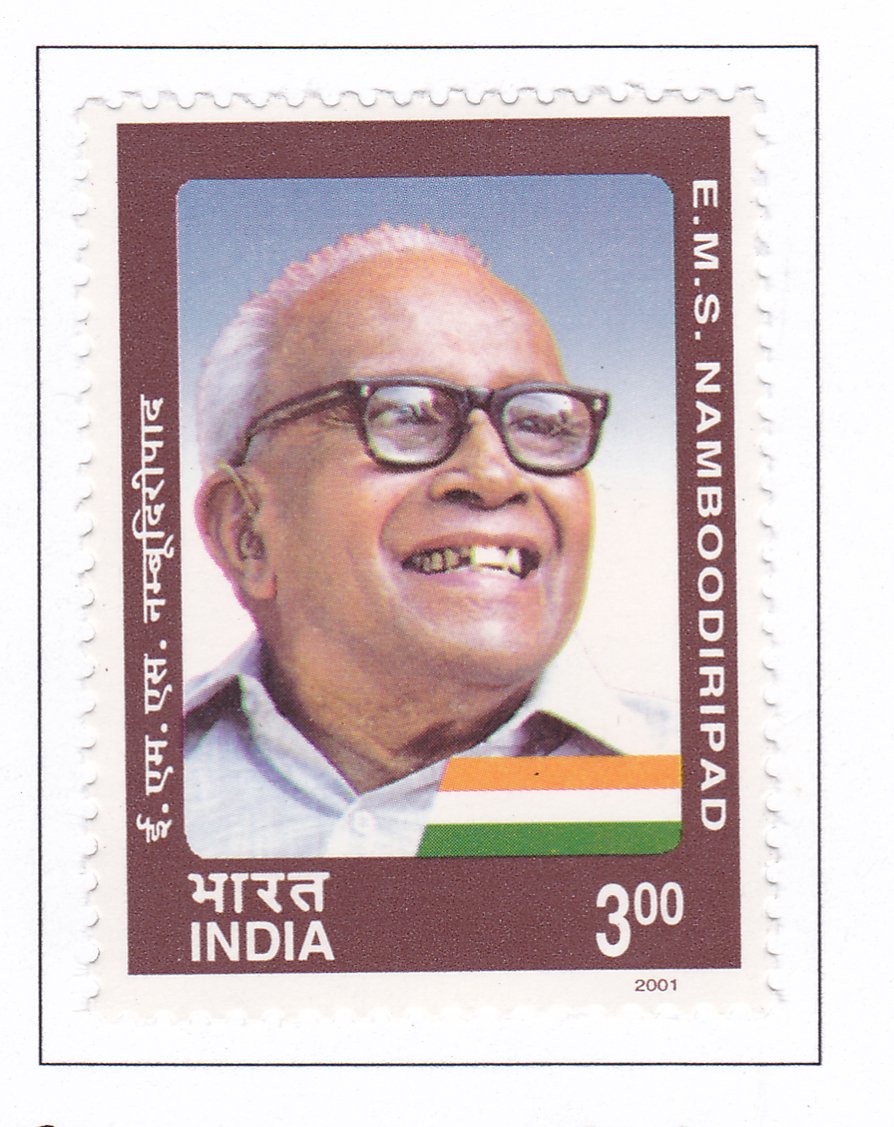E.M.S. Namboodiripad (1909-1998)

Technical Data
| Stamp Set | Personality Series |
|---|---|
| Date of Issue | January 27, 2001 |
| Denomination | Rs. 3 |
| Quantity | 400,000 |
| Perforation | comb 13 |
| Printer | Madras Security Printers |
| Watermark | No Watermark |
| Colors | Multicolor |
| Catalog Codes |
Michel IN 1814 Stamp Number IN 1875 Yvert et Tellier IN 1579 Stanley Gibbons IN 1981 |
| Themes | Famous people | Men | Optical Instruments | Politicians |
Commemorative Stamp on E.M.S. Namboodiripad
Table of Contents
Design Elements:
Stamp Design:
- Portrait: A detailed image of E.M.S. Namboodiripad is depicted, showcasing his stature as a political thinker and leader. His image represents his pioneering role in both the Indian Freedom Struggle and the early political development of Kerala.
- Background: The background features subtle elements symbolizing Kerala’s land reforms and pro-poor policies, which were hallmarks of his political career.
Key Features:
- Main Image: A frontal portrait of E.M.S. Namboodiripad in his characteristic simplicity, wearing traditional attire.
- Artistic Style: The stamp employs warm tones to convey his legacy as a progressive leader, with a backdrop of farming fields, symbolizing his work on land reforms.
Historical and Cultural Significance:
- Freedom Fighter Turned Marxist: E.M.S. Namboodiripad began his public life as a Congress worker during the Indian Independence Movement. However, his search for long-term solutions to problems like poverty and inequality led him toward Marxism, becoming a key figure in Indian political history.
- Formation of the Communist Party in Kerala: In 1936, Namboodiripad played a crucial role in founding the Communist Party in Kerala. His leadership was instrumental in shaping the political landscape of the state. His ability to meld Marxist ideology with Kerala’s socio-economic needs garnered widespread support.
- First Communist Government in India: He made history by leading the first democratically elected Communist government in the world in 1957. His government’s progressive measures, particularly the land reform legislation, marked a new phase in Kerala’s development and had long-lasting effects on reducing inequality.
- Pro-Poor Legislation: His government worked on revolutionary pro-poor measures, including education and healthcare reforms, which brought solace and dignity to millions of people in the state. His policies fostered inclusive development, setting an example for other states.
- Brilliant Marxist Theoretician: Besides his political career, Namboodiripad was an accomplished Marxist intellectual and theoretician. His vast body of writings covered a wide range of subjects, and he became known for his sharp analyses of Indian society through a Marxist lens. His autobiography in Malayalam won an award from the Kerala Sahitya Academy, showcasing his intellectual and literary prowess.
Commemorative Significance:
- Release Date: This stamp is part of a collection issued by the Department of Posts to recognize leaders who contributed to the growth and stability of India’s democracy.
- Honoring a Legacy: The issuance of this stamp celebrates Namboodiripad’s contributions not only to Kerala’s political development but also to the broader national discourse on socialism and Marxism. His legacy continues to inspire generations of politicians and activists advocating for social justice and equity.
First Day Cover:
- Design: The cover might depict E.M.S. Namboodiripad in a symbolic scene representing the land reforms that defined his tenure as Chief Minister. It could also include a backdrop of fields or educational institutions to represent his efforts toward social upliftment.
- Additional Features: Key events and milestones in Namboodiripad’s political career, such as the formation of the first Communist government, his leadership in the Freedom Struggle, and his prolific writings, might be highlighted.
Educational and Inspirational Value:
- Progressive Leadership: The stamp aims to draw attention to Namboodiripad’s work for the marginalized and disadvantaged sections of society, including his efforts to address systemic inequality through land reforms and his championing of public education and healthcare.
- Intellectual Contribution: His intellectual contributions as a Marxist thinker continue to influence political debates and discussions on socio-economic development in India.
The commemorative stamp on E.M.S. Namboodiripad serves as a tribute to his political leadership, revolutionary ideas, and commitment to the welfare of the people. His legacy remains a significant chapter in the history of Indian politics and governance.
